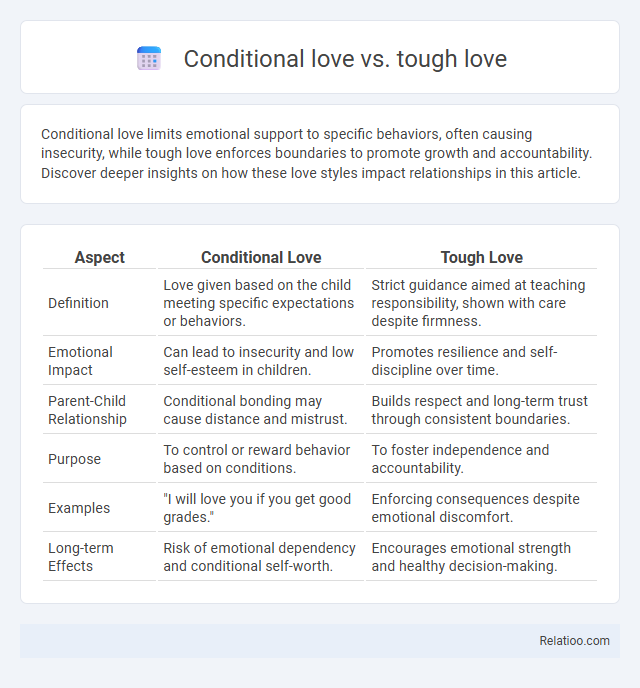Conditional love limits emotional support to specific behaviors, often causing insecurity, while tough love enforces boundaries to promote growth and accountability. Discover deeper insights on how these love styles impact relationships in this article.
Table of Comparison
| Aspect | Conditional Love | Tough Love |
|---|---|---|
| Definition | Love given based on the child meeting specific expectations or behaviors. | Strict guidance aimed at teaching responsibility, shown with care despite firmness. |
| Emotional Impact | Can lead to insecurity and low self-esteem in children. | Promotes resilience and self-discipline over time. |
| Parent-Child Relationship | Conditional bonding may cause distance and mistrust. | Builds respect and long-term trust through consistent boundaries. |
| Purpose | To control or reward behavior based on conditions. | To foster independence and accountability. |
| Examples | "I will love you if you get good grades." | Enforcing consequences despite emotional discomfort. |
| Long-term Effects | Risk of emotional dependency and conditional self-worth. | Encourages emotional strength and healthy decision-making. |
Understanding Conditional Love
Understanding conditional love involves recognizing that affection and support are given only when specific criteria or behaviors are met, which can lead to feelings of insecurity or inadequacy. This contrasts with tough love, where discipline and boundaries are enforced out of care to promote growth, even if it feels harsh. Your awareness of these differences helps navigate relationships where love may depend on conditions, affecting emotional well-being and trust.
Defining Tough Love
Tough love is a parenting or relational approach characterized by setting clear boundaries and enforcing consequences to promote personal responsibility and growth. Unlike conditional love, which offers affection only when certain conditions are met, tough love provides consistent support while demanding accountability from your loved ones. This method balances compassion with discipline to help individuals develop resilience and self-discipline.
Key Differences Between Conditional and Tough Love
Conditional love depends on meeting specific expectations or behaviors to receive affection, while tough love involves setting firm boundaries and consequences to promote personal growth and responsibility. Your emotional support in tough love is consistent but paired with accountability, whereas conditional love may withdraw affection if conditions are unmet. Understanding these distinctions helps foster healthier relationships by balancing care with discipline.
Psychological Impact on Recipients
Conditional love often leads to feelings of insecurity and self-doubt as recipients may constantly question their worth based on meeting specific criteria. Tough love, characterized by strict boundaries combined with genuine care, promotes personal growth and resilience while maintaining emotional stability. Understanding the psychological impact of these love types can help you foster healthier relationships that balance support with constructive challenges.
Signs of Conditional Love in Relationships
Signs of conditional love in relationships often include feelings of insecurity, where affection and support are given based on meeting specific expectations or behaviors. Partners may experience emotional withdrawal, criticism, or withholding of love as a response to perceived shortcomings. This dynamic contrasts with tough love, which enforces boundaries for personal growth without withdrawing care, highlighting how conditional love can undermine trust and emotional stability.
Benefits and Drawbacks of Tough Love
Tough love enforces boundaries and accountability, promoting personal responsibility and resilience, but it risks damaging trust and emotional connections if perceived as harsh. Benefits include encouraging positive behavior change and fostering independence, while drawbacks involve potential alienation and reduced emotional support. Compared to conditional love, which ties affection to behavior, tough love emphasizes firmness with underlying care, balancing discipline and support for long-term growth.
Conditional Love in Parenting
Conditional love in parenting involves affection and approval based on a child's behavior or achievements, which can lead to feelings of insecurity and low self-esteem. Tough love combines firm boundaries and discipline with care, promoting responsibility while maintaining a supportive environment. You benefit most from balanced parenting that provides unconditional support alongside clear expectations, fostering healthy emotional development.
Tough Love in Romantic Partnerships
Tough love in romantic partnerships involves setting clear boundaries and enforcing consequences to promote growth and responsibility, contrasting with conditional love, which depends on meeting specific expectations. This approach fosters a healthier dynamic by encouraging accountability while maintaining emotional support, rather than withdrawing affection or approval. Implementing tough love can strengthen relationships by balancing firmness with care, ultimately leading to increased mutual respect and personal development.
When to Use Conditional vs Tough Love
Conditional love involves offering affection or support only when certain expectations are met, which can teach accountability but may risk emotional dependency. Tough love emphasizes setting firm boundaries and consequences to encourage personal responsibility and growth, often used in situations involving addiction or harmful behaviors. Use conditional love when reinforcing positive behavior patterns is necessary, while tough love is more effective during moments requiring strict discipline to correct destructive habits.
Building Healthy Love Boundaries
Building healthy love boundaries requires distinguishing between conditional love, tough love, and unconditional love. Conditional love often imposes expectations that can undermine self-worth, while tough love fosters growth by setting firm limits aligned with care and respect. Establishing clear, consistent boundaries in relationships promotes mutual understanding, emotional security, and balanced support essential for healthy connections.

Infographic: Conditional love vs Tough love
 relatioo.com
relatioo.com